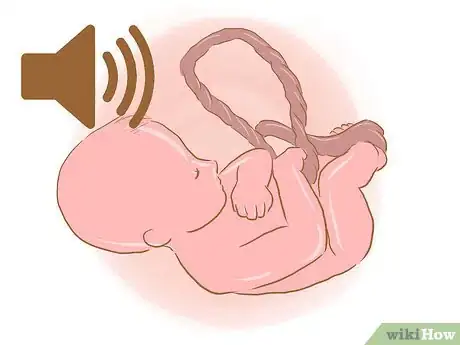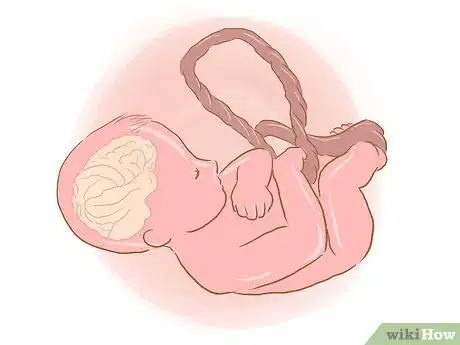wikiHow is a “wiki,” similar to Wikipedia, which means that many of our articles are co-written by multiple authors. To create this article, volunteer authors worked to edit and improve it over time.
There are 9 references cited in this article, which can be found at the bottom of the page.
This article has been viewed 75,729 times.
Learn more...
A baby's hearing develops while they are still in the womb. Generally, babies react to sounds coming from the outside by moving or displaying a rapid or slow heartbeat. At around 20 weeks in the mother’s womb, the baby can hear[1] , and at about 26 weeks in the wound, the baby will react to sounds and external stimuli. Sounds like singing, talking, and playing music to your baby while in the womb become especially important during the last 10 weeks of pregnancy, when your baby’s ears are connecting to their brain.[2]
Steps
Choosing the Right Music
-
1Look for music that is soothing, rather than too loud or aggressive. Classical music is ideal, as babies in the womb will appreciate the calming sounds and may begin to breathe in time to the music.[3]
- Look for classical options like music by Beethoven, Mozart, or Bach, but be aware that certain compositions can have loud passages.
- In fact, Mozart's music is said to affect the brain development of its listeners, in particular spatial memory. The center for music activities in the brain is in the right hemisphere of the brain, which also includes the center for spatial relationships among objects. So it is possible that development of one part of the brain could affect the development of another part in the same area of the brain.
-
2Find music the mother also likes. If the baby’s mom does not enjoy classical music, for example, then it will not have a beneficial effect on the baby in her belly.
- You can try alternatives to classical music like lullabies and new age music. Popular CDs include Baby Einstein, Disney Lullabies, and Dreamland lullabies.[4]
- You can also try other musical styles that are not too noisy and loud, such as slow R&B, reggae, and pop tracks.[5]
- Record sounds of nature, water, and waves can also be soothing for a baby in the womb.
- Look for music that is harmonious and has a basic melody. Dramatic changes in rhythm, tempo, and volume of the music can disturb the baby and can cause the baby to be startled.
Advertisement -
3Get advice from an associate at a music store or on blogs. If you aren’t sure what is appropriate for a baby in the womb, ask for help at your local music store.
- You can also go online and search for soothing music intended for babies on blogs.
Playing Music for Your Baby
-
1Play music for your baby on stereo speakers rather than using headphones on the mother’s pregnant stomach. Contrary to popular belief, putting headphones on a pregnant stomach isn’t necessary; In fact, it can make the music too loud for the baby.[6] and overstimulate him.[7] Instead, playing music in your house will filter into the womb.
-
2Be aware of the volume of the music. The amniotic fluid in the womb will amplify the sound and make things much louder to the baby than they might sound to the parents.[8]
- Aim to keep music around 50-60 decibels, or about the level of a washing machine to make it comfortable for the baby.[9] To put it in perspective, 60 decibels is the noise level of a normal conversation, 30 decibels is a whisper, so 50 decibels is a good in-between level of noise.
- The American Association of Pediatricians has found that babies exposed to loud music for a long period of time are more likely to be born prematurely and have other negative side effects like low birth weight and hearing deficiencies.
-
3Expose your baby to 5-10 minutes of music twice a day, or a maximum of 1 hour a day. Do not go overboard with the amount of time you play music for your baby in the womb. Too much exposure to music may over-stimulate the baby.
Understanding the Benefits of Playing Music for a Baby in the Womb
-
1Play music for your baby to make the womb a soothing, relaxing place. Though the womb is a naturally relaxing environment for your baby, it is also loud with the sounds of amniotic fluid, the mother’s heartbeat, and other outside noises, so calming music will help your baby relax even further.
-
2Expose your baby to music to help with their brain development. Studies have shown that babies who hear the same song, such as a lullaby, multiple times while in the womb will recognize the song once they are born.[10]
- Singing lullabies or other children’s songs to your baby while in the womb can strengthen their relationship with their parents and help the baby recognize your voices once they are born.[11]
-
3Keep in mind there is no scientific evidence to suggest listening to classical music in the womb can make your baby smarter. Playing classical music for the baby also does not mean they will enjoy classical music once they are born.[12]
- Numerous studies have focused on the study of influence music on the baby in the womb but it's difficult to know exactly what a baby in the womb thinks and feels. But if playing music for them is done with care and at the right volume, it certainly cannot hurt.
-
4Remember that the music will also reduce stress on the mother, which in turn will also reduce stress for the unborn baby. Any increases in stress in the mother means an increase in cortisol, which travels through the mother’s bloodstream and into the placenta around the baby. In fact, stress during pregnancy can lead to serious consequences like premature birth, low weight in the baby and a greater chance of miscarriages.
- Music, especially if it suits the mother’s tastes, can reduce stress and stimulate beneficial emotions that lead to a release of serotonin and endorphins in the mother, which will also put the baby in a good mood, too.
References
- ↑ http://www.babycenter.com/0_music-and-your-unborn-child_6547.bc
- ↑ http://nymag.com/daily/intelligencer/2013/04/ask-a-best-doctor-is-music-in-the-womb-good.html
- ↑ http://pregnancy.more4kids.info/336/effect-of-music-on-the-fetus/
- ↑ http://www.webmd.com/baby/features/bonding-with-baby-before-birth
- ↑ http://www.thebabycorner.com/page/2508/
- ↑ http://www.webmd.com/baby/news/20130102/babies-learn-womb
- ↑ http://www.babycenter.com/0_music-and-your-unborn-child_6547.bc
- ↑ http://www.webmd.com/baby/news/20130102/babies-learn-womb
- ↑ http://www.babycenter.com/0_music-and-your-unborn-child_6547.bc
- ↑ http://www.washingtonpost.com/national/health-science/newborn-babies-in-study-recognized-songs-played-to-them-while-in-the-womb/2013/11/02/294fc458-433d-11e3-a624-41d661b0bb78_story.html
- ↑ http://www.webmd.com/baby/news/20130102/babies-learn-womb
- ↑ http://nymag.com/daily/intelligencer/2013/04/ask-a-best-doctor-is-music-in-the-womb-good.html




































































